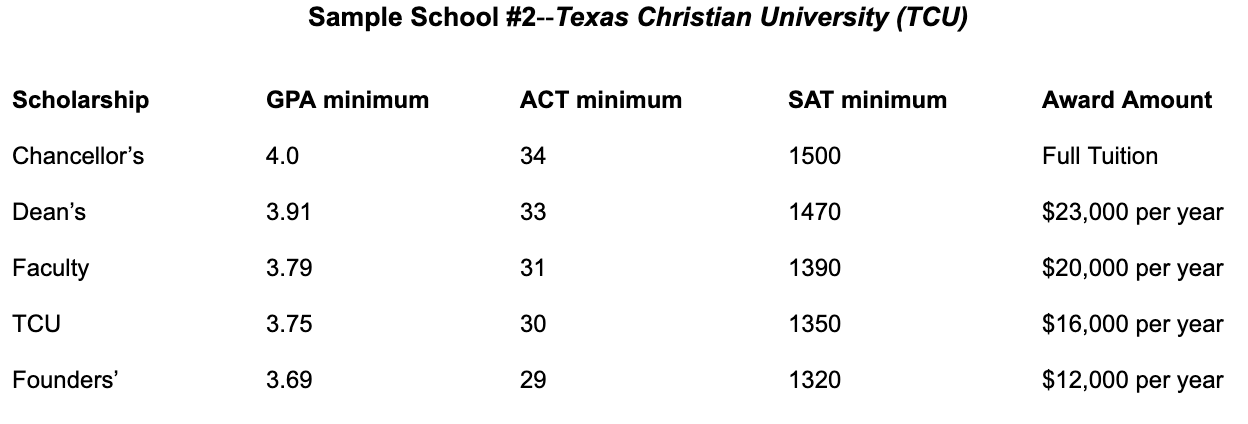A lot—time, money, stress, energy, etc.—has been invested into achieving high ACT/SAT scores. Merit-based scholarships can be an excellent reward for all of your hard work.
Scoring well on the ACT and/or SAT can help pay for college through merit-based scholarships. Many private organizations and universities offer merit-based scholarships, which provide financial awards based off of a combination of GPA, class rank, and/or ACT/SAT scores.
Merit-based scholarships vary from college to college, so you’ll need to do a little research to find out whether your student qualifies for your dream school's merit-based scholarships. Often, no additional scholarship application is required, and applicants are automatically considered for these merit-based scholarships.
For instance, UC schools offer the Regent’s Scholarships (merit-based scholarships that are awarded in four increments over the students’ college career). At UCSD, a student could be awarded up to $8,000 based solely on academic excellence, and, at UC Berkeley, a student could receive up to $10,000.
However, there are some schools, including all Ivy League universities, that do not offer merit-based scholarships.

HOW TO APPLY: DO NOTHING. (YOU ARE AUTOMATICALLY CONSIDERED FOR THESE SCHOLARSHIPS WHEN APPLYING TO THE SCHOOL.) FIND MORE INFO HERE: HTTPS://FINANCIALAID.UOREGON.EDU/SCHOLARSHIPS_FRESHMEN

HOW TO APPLY: DO NOTHING. (YOU ARE AUTOMATICALLY CONSIDERED FOR THESE SCHOLARSHIPS WHEN APPLYING TO THE SCHOOL, THOUGH NOT GUARANTEED THEM.) TCU DOES SUPERSCORE. FIND MORE INFO HERE: HTTPS://ADMISSIONS.TCU.EDU/AFFORD/SCHOLARSHIP-AID/INDEX.PHP

IF THE TABLE ABOVE MAKES NO SENSE TO YOU, SEE SLIDING SCALE CHART HERE: HTTPS://FINANCIALAID.ARIZONA.EDU/TYPES-OF-AID/SCHOLARSHIPS/FRESHMAN-TRANSFER
HOW TO APPLY: DO NOTHING. (YOU ARE AUTOMATICALLY CONSIDERED FOR THESE SCHOLARSHIPS WHEN APPLYING TO THE SCHOOL.)
When planning out how to pay for college, you should take advantage of the many resources on the Internet. Here are just a few of the wonderful resources out there:
-
Here’s a list of San Diego Organization-Sponsored Scholarships: https://www.sdfoundation.org/students/local-scholarships/
-
Coca-Cola compiled a scholarship resource list, in addition to awarding 150 recipients with $20,000 each year: https://www.coca-colascholarsfoundation.org/apply/
-
Scholar Snapp is a common application for a wide array of scholarships: https://www.scholarsnapp.org/
-
Niche is a one of several search engines to sort through the thousands of scholarships on the Internet: https://www.niche.com/colleges/scholarships/
Takeaways—Those one or two extra points on the ACT, or just 20-50 more points on the SAT can be a big deal and worth thousands of dollars in merit aid.
What to do next? Make sure you stay on top of your high school GPA, take those challenging classes in the field you are interested in pursuing, and aim for the highest test scores you can reach.
Where to apply? Choose colleges and universities that put your student’s GPA and ACT or SAT test scores in the top 25% of their admittance statistics. Not all colleges readily publicize their merit aid matrix, so do call their admissions office to find out what they offer.
We hope this helps!
